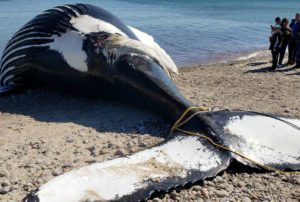SANDWICH – A volunteer responder with the International Fund for Animal Welfare (IFAW) says injury and predation may not be causes of the gruesome appearance of the beached humpback whale carcass in Sandwich.
The carcass of the 45-foot whale was discovered in the waters of Stellwagen Bank, an area of ocean located just outside Cape Cod Bay and North of Provincetown, before washing ashore at a Sandwich beach at approximately 3:30 p.m. Monday.
A volunteer responder for the International Fund for Animal Welfare (IFAW) says the notable open gashes on the whale’s backside may not have been due to some sort of injury or predation by another sea animal.
“It looks gruesome, but it’s not necessarily an injury. What you’re actually seeing here is the genital slit, and this is prolapsed uterine material,” said Sherian, an IFAW Advanced Volunteer Responder.
“What we know is that this is prolapsed uterine material. There’s lots of reasons for that possibly happening. One very good reason would be the buildup of all the gases and things like decay, and that just went ‘boom’ and blew out. We won’t know anything until we open her up.”
Researchers from the Center for Coastal Studies in Provincetown and the Marine Mammal Stranding Network, run by the National Oceanic and Atmospheric Administration, are also investigating the death.
Sherian says the whale is a mature female, named Vector, who was first catalogued in 1985.
“She became known in 1985. She was an adult in 1985 when she was named and she’s been followed since then. Three to five years to adulthood. She was minimum of 37-years-old,” said Sherian.
“Prevailing winds and current, she was supposed to make landfall in Marshfield. She landed here at 3:30 p.m.”
Humpback whales are known to live to a maximum age of about 60, with an average lifespan of about 47.
The cause of death remains unknown as investigators from a number of agencies analyze the carcass.
With the cause still unknown, Sherian advises the public to not touch the carcass or bring pets to view it. With bacterial disease remaining a possible cause of the whale’s death, she says ‘good safety standards’ need to be practiced to prevent any transmission of these diseases.
“The big problem for humans is that a lot of these diseases transmit to humans very easily and we can get very sick, and especially to domestic pets, dogs especially,” Sherian said.
“We need to make sure we’re practicing good safety standards for ourselves.”
By TIM DUNN, CapeCod.com News Center


























